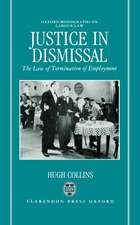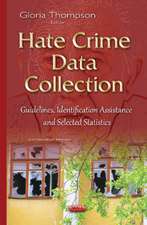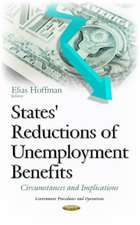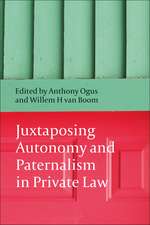Regulation: Legal Form and Economic Theory: Clarendon Law Series
Autor Anthony Ogusen Limba Engleză Paperback – 13 oct 1994
Din seria Clarendon Law Series
- 13%
 Preț: 323.23 lei
Preț: 323.23 lei - 12%
 Preț: 336.56 lei
Preț: 336.56 lei - 8%
 Preț: 250.54 lei
Preț: 250.54 lei - 18%
 Preț: 325.98 lei
Preț: 325.98 lei - 8%
 Preț: 338.03 lei
Preț: 338.03 lei - 7%
 Preț: 326.69 lei
Preț: 326.69 lei -
 Preț: 357.27 lei
Preț: 357.27 lei - 13%
 Preț: 323.66 lei
Preț: 323.66 lei - 27%
 Preț: 305.31 lei
Preț: 305.31 lei - 9%
 Preț: 273.78 lei
Preț: 273.78 lei - 22%
 Preț: 330.86 lei
Preț: 330.86 lei - 13%
 Preț: 322.23 lei
Preț: 322.23 lei - 9%
 Preț: 321.09 lei
Preț: 321.09 lei - 34%
 Preț: 788.01 lei
Preț: 788.01 lei - 19%
 Preț: 498.24 lei
Preț: 498.24 lei -
 Preț: 342.45 lei
Preț: 342.45 lei - 34%
 Preț: 923.76 lei
Preț: 923.76 lei -
 Preț: 348.62 lei
Preț: 348.62 lei - 34%
 Preț: 1111.08 lei
Preț: 1111.08 lei - 38%
 Preț: 236.38 lei
Preț: 236.38 lei - 19%
 Preț: 333.65 lei
Preț: 333.65 lei - 9%
 Preț: 348.99 lei
Preț: 348.99 lei - 13%
 Preț: 343.38 lei
Preț: 343.38 lei -
 Preț: 328.71 lei
Preț: 328.71 lei - 9%
 Preț: 327.73 lei
Preț: 327.73 lei - 18%
 Preț: 328.58 lei
Preț: 328.58 lei - 34%
 Preț: 658.08 lei
Preț: 658.08 lei - 12%
 Preț: 400.44 lei
Preț: 400.44 lei - 22%
 Preț: 404.32 lei
Preț: 404.32 lei - 14%
 Preț: 197.43 lei
Preț: 197.43 lei - 26%
 Preț: 730.21 lei
Preț: 730.21 lei -
 Preț: 336.82 lei
Preț: 336.82 lei - 28%
 Preț: 348.76 lei
Preț: 348.76 lei - 22%
 Preț: 399.44 lei
Preț: 399.44 lei - 13%
 Preț: 838.14 lei
Preț: 838.14 lei -
 Preț: 335.56 lei
Preț: 335.56 lei -
 Preț: 314.58 lei
Preț: 314.58 lei
Preț: 342.46 lei
Preț vechi: 469.38 lei
-27% Nou
Puncte Express: 514
Preț estimativ în valută:
65.53€ • 68.42$ • 54.23£
65.53€ • 68.42$ • 54.23£
Carte tipărită la comandă
Livrare economică 24-31 martie
Preluare comenzi: 021 569.72.76
Specificații
ISBN-13: 9780198259343
ISBN-10: 0198259344
Pagini: 384
Dimensiuni: 157 x 234 x 22 mm
Greutate: 0.6 kg
Editura: Clarendon Press
Colecția Clarendon Press
Seria Clarendon Law Series
Locul publicării:Oxford, United Kingdom
ISBN-10: 0198259344
Pagini: 384
Dimensiuni: 157 x 234 x 22 mm
Greutate: 0.6 kg
Editura: Clarendon Press
Colecția Clarendon Press
Seria Clarendon Law Series
Locul publicării:Oxford, United Kingdom
Recenzii
`Very useful book, good overview.'Professor dr. H.J. de Ru, Vrye Universiteit, The Netherlands
`Well produced, good value, comprehensive.'T. Prosser, University of Glasgow
`The book is very well written and presented.'N. Emiliou, Queen Mary & Westfield College, University of London
`Helpful and accessible text on a rapidly emerging area.'J. Gott, University of Sheffield
`A much needed text. This well-researched text linking economic theories with policies demonstrates the law's association with both. Excellently written - thorough survey of the issues surrounding regulatory practices.'Stephen Hardy, University of Staffordshire
Anthony Ogus's book must be considered one of the best works in the area of regulation ... this book is free of legal jargon ... one of the most important books on regulation ever to be seen. Buy it.
This is an excellent and long-awaited book ... there has long been a need for a work to examine the ways in which public law is used to control industrial activity. Ogus's latest offering fills this gap, and, with the aid of economic theory, presents a convincing account of the regulatory process ... While it is now, and is not intended to be, a guide to regulatory laws, it provides an outstanding explanation of the context in which those laws operate. There seems little doubt that the book will become a classic, and so it should.
'essential reading for any student of regulation...One common complaint from compliance officers is that theirs, being a relatively new profession, lacks much learning and scholarship of its own - these books are a worthy response to such complaints.'
'an impressive contribution to the justly prestigious Clarendon Law Series. There is no book currently on the market which provides a better general introduction to the areas of social and economic regulation from a legal perspective for legal and non-legal audiences...extraordinarily readable, even elegant, when discussing notoriously difficult economic concepts...But the book should have (certainly deserves to have) a readership well beyond the academic...Ogus' book should be in the kit-bag of aspiring Ministers (or at least their advisers), Parliamentary Select Committee chairmen and women, and permanent secretaries.'
'This book is an example of good law and economics scholarship. It is stimulating and useful to both lawyers and economists.'
`Well produced, good value, comprehensive.'T. Prosser, University of Glasgow
`The book is very well written and presented.'N. Emiliou, Queen Mary & Westfield College, University of London
`Helpful and accessible text on a rapidly emerging area.'J. Gott, University of Sheffield
`A much needed text. This well-researched text linking economic theories with policies demonstrates the law's association with both. Excellently written - thorough survey of the issues surrounding regulatory practices.'Stephen Hardy, University of Staffordshire
Anthony Ogus's book must be considered one of the best works in the area of regulation ... this book is free of legal jargon ... one of the most important books on regulation ever to be seen. Buy it.
This is an excellent and long-awaited book ... there has long been a need for a work to examine the ways in which public law is used to control industrial activity. Ogus's latest offering fills this gap, and, with the aid of economic theory, presents a convincing account of the regulatory process ... While it is now, and is not intended to be, a guide to regulatory laws, it provides an outstanding explanation of the context in which those laws operate. There seems little doubt that the book will become a classic, and so it should.
'essential reading for any student of regulation...One common complaint from compliance officers is that theirs, being a relatively new profession, lacks much learning and scholarship of its own - these books are a worthy response to such complaints.'
'an impressive contribution to the justly prestigious Clarendon Law Series. There is no book currently on the market which provides a better general introduction to the areas of social and economic regulation from a legal perspective for legal and non-legal audiences...extraordinarily readable, even elegant, when discussing notoriously difficult economic concepts...But the book should have (certainly deserves to have) a readership well beyond the academic...Ogus' book should be in the kit-bag of aspiring Ministers (or at least their advisers), Parliamentary Select Committee chairmen and women, and permanent secretaries.'
'This book is an example of good law and economics scholarship. It is stimulating and useful to both lawyers and economists.'

















